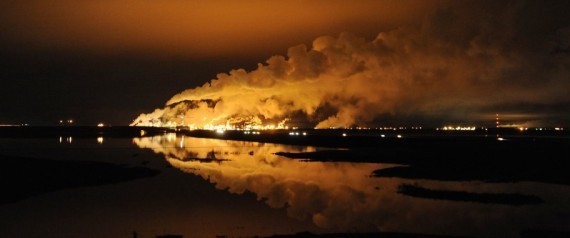Conservatives in the Senate want to change the tax laws regarding environmental groups in Canada who protest energy projects.
According to a senior Conservative, any group that protests developing Alberta's oilsands should lose its charitable status.
"It should never be considered a charitable act to attack Canada's oilsands," said Senator Doug Finley in his speech as part of an inquiry into foreign foundations providing money to Canadian charities.
The inquiry was launched last week by Conservative Senator Nicole Eaton and is essentially a take note debate — a series of speeches by Conservative senators who are raising questions about how U.S. foundations are funnelling money into Canadian charities.
The Senate is focussing particularly on environmental charities, claim these charities use foreign money to protest everything from fish farming to expansion of the oilsands industry.
'Shady foreign money'
Finley, who is the former national campaign director for the federal Conservative Party, says that foreign funding is undermining Canada's economy.
"Shady foreign money is being used to influence Canadian domestic and commercial policy in an obscure fashion," he told the Senate Tuesday.
"U.S. charitable foundations which may perhaps have their own economic and market driven agenda, are contributing major dollars to pseudo and radical environmental groups in Canada."
Finley used the example of the foundation Tides Canada, which provides money to 230 charities in Canada to work on environmental issues. He claims groups like the World Wildlife Fund and Greenpeace have used that money to fund their "tarsands campaigns."
"For some perverse reason, Tides and other multi-billion-dollar foreign foundations see it as a more effective investment to adversely disrupt Canada's economy than to contribute to other more needy parts of the world," said Finley.
Finley says that all charities should have to disclose where they get their money and how they spend it. Right now charities, including environmental groups, can write off donations on their taxes. They are allowed to spend up to 10 per cent of that money on such activities as protests.
They see the Senate inquiry as an attempt to muzzle opposition to big energy projects, and Liberal Senator Grant Mitchell agrees with them.
He says environmental groups play an important role in reflecting the concerns of a sizable portion of the public. He warns against any change to the tax law that would treat environmental charities differently than others.
"Which dictator would say it's okay for this group to participate with its charitable status in public policy debate and it's not okay for this group to take part in a public policy debate? And what would the difference be? The difference would be whether or not that group would take the side the government likes...and that would be a fundamental problem," said Mitchell.
The Senate inquiry could eventually lead to changes in the Canada Revenue Act, which would still have to be approved by the House of Commons.
Original Article
Source: Huff
Author: cbc
According to a senior Conservative, any group that protests developing Alberta's oilsands should lose its charitable status.
"It should never be considered a charitable act to attack Canada's oilsands," said Senator Doug Finley in his speech as part of an inquiry into foreign foundations providing money to Canadian charities.
The inquiry was launched last week by Conservative Senator Nicole Eaton and is essentially a take note debate — a series of speeches by Conservative senators who are raising questions about how U.S. foundations are funnelling money into Canadian charities.
The Senate is focussing particularly on environmental charities, claim these charities use foreign money to protest everything from fish farming to expansion of the oilsands industry.
'Shady foreign money'
Finley, who is the former national campaign director for the federal Conservative Party, says that foreign funding is undermining Canada's economy.
"Shady foreign money is being used to influence Canadian domestic and commercial policy in an obscure fashion," he told the Senate Tuesday.
"U.S. charitable foundations which may perhaps have their own economic and market driven agenda, are contributing major dollars to pseudo and radical environmental groups in Canada."
Finley used the example of the foundation Tides Canada, which provides money to 230 charities in Canada to work on environmental issues. He claims groups like the World Wildlife Fund and Greenpeace have used that money to fund their "tarsands campaigns."
"For some perverse reason, Tides and other multi-billion-dollar foreign foundations see it as a more effective investment to adversely disrupt Canada's economy than to contribute to other more needy parts of the world," said Finley.
Finley says that all charities should have to disclose where they get their money and how they spend it. Right now charities, including environmental groups, can write off donations on their taxes. They are allowed to spend up to 10 per cent of that money on such activities as protests.
They see the Senate inquiry as an attempt to muzzle opposition to big energy projects, and Liberal Senator Grant Mitchell agrees with them.
He says environmental groups play an important role in reflecting the concerns of a sizable portion of the public. He warns against any change to the tax law that would treat environmental charities differently than others.
"Which dictator would say it's okay for this group to participate with its charitable status in public policy debate and it's not okay for this group to take part in a public policy debate? And what would the difference be? The difference would be whether or not that group would take the side the government likes...and that would be a fundamental problem," said Mitchell.
The Senate inquiry could eventually lead to changes in the Canada Revenue Act, which would still have to be approved by the House of Commons.
Original Article
Source: Huff
Author: cbc

No comments:
Post a Comment